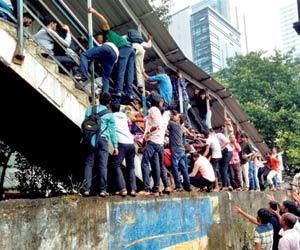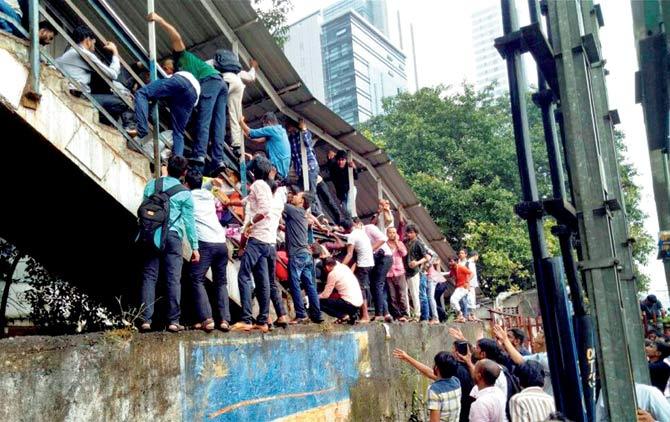The excuses made by the authorities have been shameful, but, who is surprised? Assuming the past is culpable, who is responsible now?

 Whenever any large-scale tragedy takes place, your thoughts will usually run first to a personal connection to the event. So when news of the Elphinstone Road foot overbridge stampede first broke, my first concern was for all the people I knew who worked in that area and used that station. For years I worked around that area and many of my colleagues were regular commuters from Elphinstone station. As have I occasionally been myself.
Whenever any large-scale tragedy takes place, your thoughts will usually run first to a personal connection to the event. So when news of the Elphinstone Road foot overbridge stampede first broke, my first concern was for all the people I knew who worked in that area and used that station. For years I worked around that area and many of my colleagues were regular commuters from Elphinstone station. As have I occasionally been myself.

Commuters who died and those who got injured were only trying to make their living, and they had no option but to trust public transport systems. File pic
ADVERTISEMENT
But, as the dust settles and the human cost has been counted, and the pain and the misery too insurmountable to deal with, you step back to the larger picture. And it is dismal, criminal and horrendous. For years now, Mumbai's basic, essential infrastructure has been crumbling and the standards of that old accolade 'Urbs primus in Indus' sounds more like the tired, meaningless joke it has become.
Overused clichés about Mumbai's 'spirit' and 'resilience' trotted out after every disaster are not just tiresome, they are now insulting. Why does Mumbai have so many disasters? Why does the city have to be seen as resilient all the time? Those commuters who died and were injured, and the commuters who were saved by the skin of their teeth, they are just trying to make an everyday living, live an everyday life. And they have no option but to trust public transport systems.
To the argument that there is no connection between this stampede and the money being spent on the bullet train between Mumbai and Ahmedabad, one can concede an 'apples and oranges' point of view. But both are still fruits, and railway infrastructure is still railway infrastructure. If the greater need is for more oranges, is the world's most expensive apple necessary? The question will be asked regardless of how many it upsets. At the bottom of it lies the fact that most of those who use the suburban train system in Mumbai do not need a superfast expensive train ride to Ahmedabad. The recent spate of derailments do, if nothing else, at least prove that an overhaul is desperately needed.
Mumbaiwallahs are often blamed for being apathetic (as well as resilient and spirited) and, therefore, complicit in the slow decay of their city. However, in this instance, several letters, emails and tweets were sent by many citizens to the authorities. But if anything was done about it or even planned, it was far too late for the 23 dead, their families and friends and the scores who were injured.
Indeed, when you think about it now, every one of those overbridges balancing on those iron rods are scary enough. List the stations where something equally horrific could happen and you've practically covered every line that services Mumbai. All tottering on the edge, all making do, all being resilient and all moving under heavy usage in a spirited, if disastrous, manner.
The excuses made by the authorities have been shameful, but, who is really surprised? Neglect is often blamed on someone else, in this case just about anything from a global slowdown to former governments to long dead ministers. Let us assume the past is culpable, but who is responsible in the present? Or is that a question that only anti-nationals will ask?
What Mumbai has to do to get out of this rut is get even more engaged with its surroundings. This is a city built on grit and enterprise. This is not a city based on patronage or legacy. It can no longer afford to sink into bad habits of the past if it wants a future.
It is worth asking why Mumbai has collapsed like an accordion out of air, why its earlier standards have vanished, which new infrastructure project has actually benefited the majority of the city, which political decision has taken the concerns of citizens into account, and why a once-involved and forward-looking bureaucracy is now as bad as, if not worse, the lowest standards seen in the rest of India.
There is a theory - now happily being used for the abysmal condition of our economy - is that once you hit rock bottom, the only way is up. The Elphinstone bridge stampede is a sure sign that Mumbai is in freefall. But there is no rule that you must get to the bottom before you get better. Use this disaster as a "no more" moment. You owe yourself that at least.
Ranjona Banerji is a senior journalist. You can follow her on Twitter @ranjona. Send your feedback to mailbag@mid-day.com
 Subscribe today by clicking the link and stay updated with the latest news!" Click here!
Subscribe today by clicking the link and stay updated with the latest news!" Click here!







